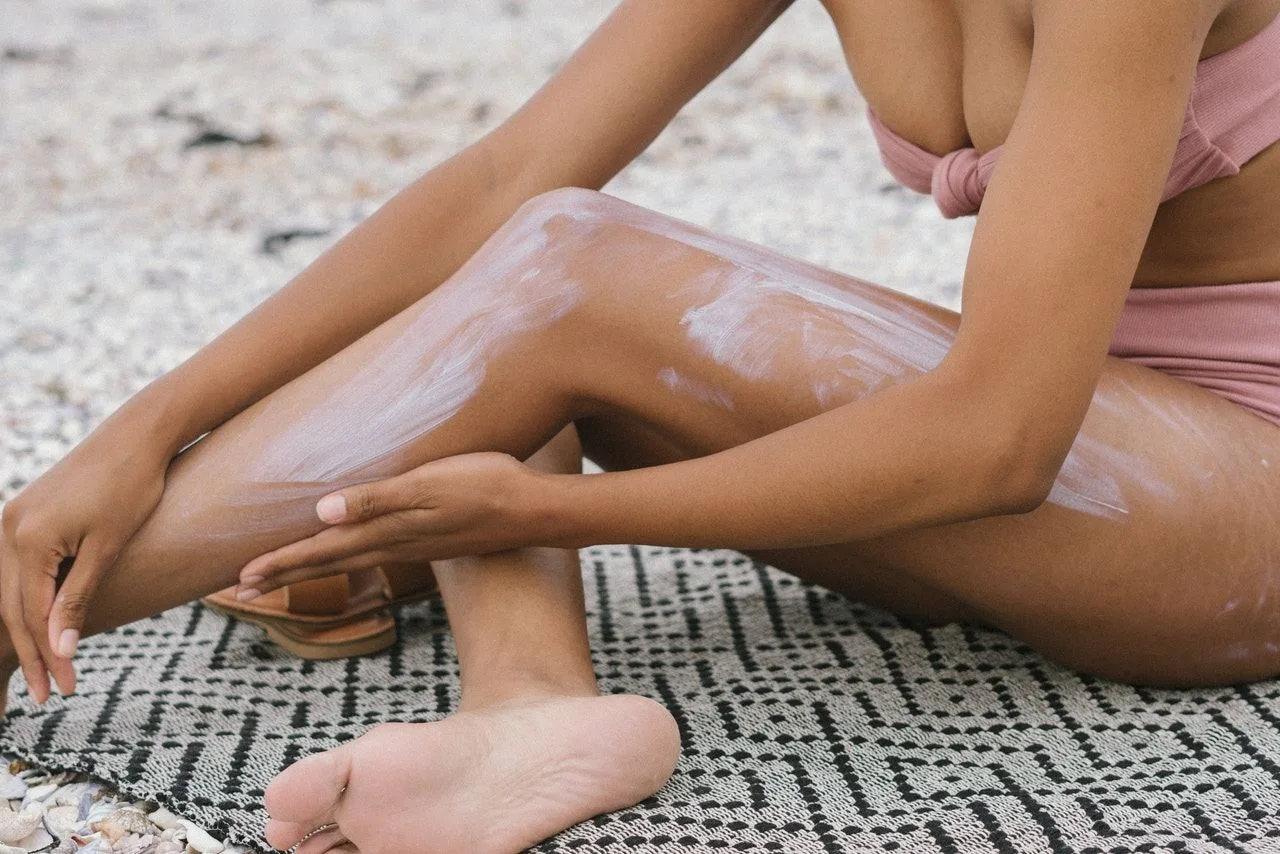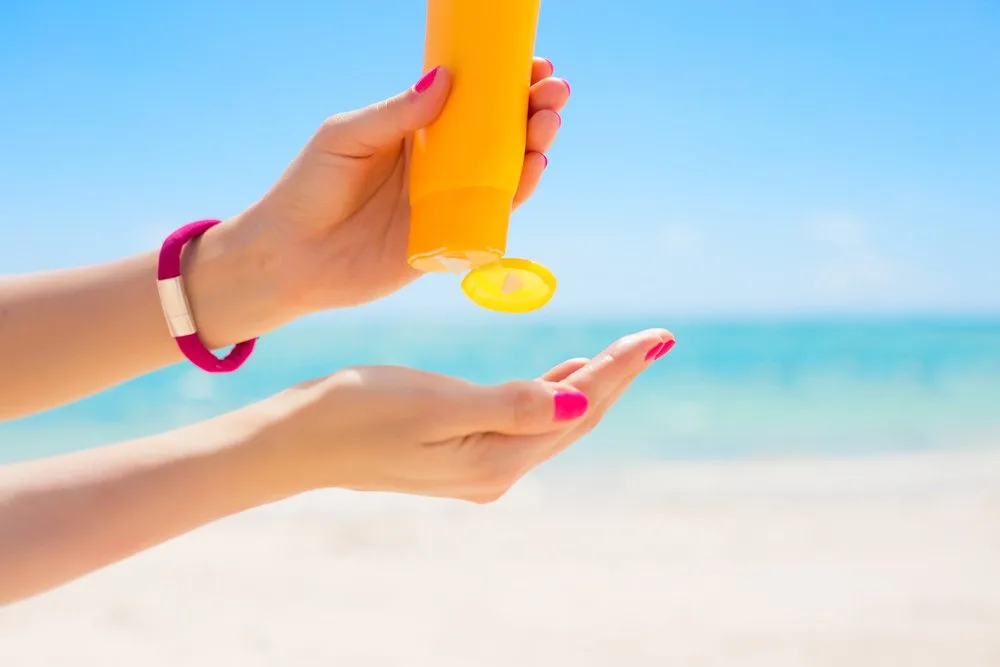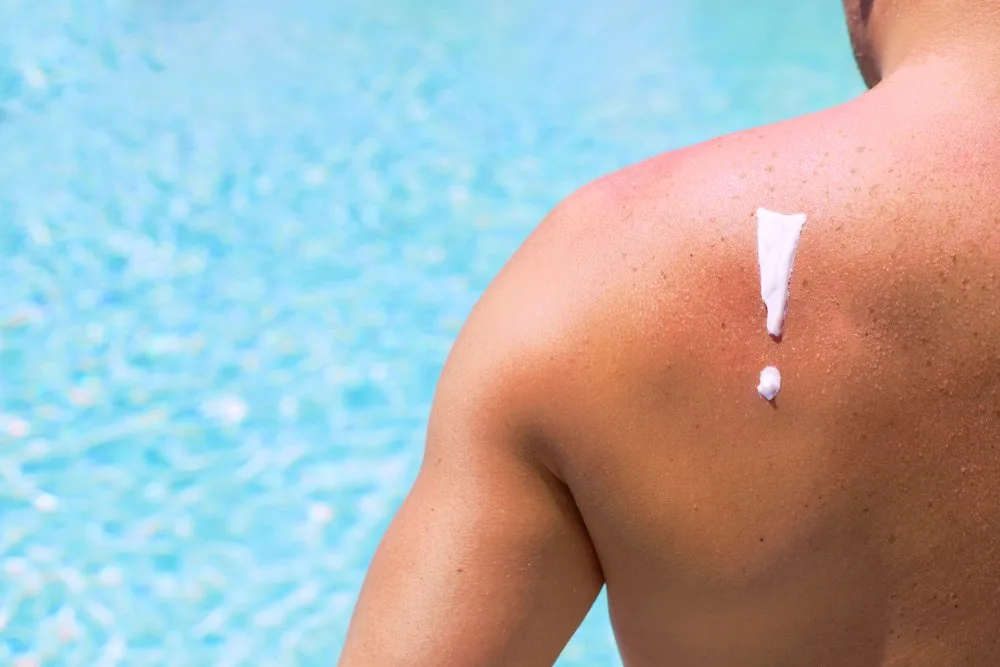Regardless of whether the sun is shining bright, or hiding behind winter clouds, you need to use sunscreen every day. Sunscreen is a necessity every day of the year. Using it won’t only protect you from sunburn, but it can also help prevent premature aging and UV-damage.
Unfortunately, like a few skincare products, sunscreen can contain toxic ingredients that aren’t always pleasant for the skin or your health. Johnson & Johnson is recalling five aerosol sunscreen products after detecting low levels of benzene, a cancer-causing agent, in some samples. This comes after a recent report discovered potentially harmful levels of benzene in several sun protection products. Benzene is a known carcinogen. After publishing the findings, the lab called on the U.S. Food and Drug Administration (FDA) to recall the affected batches, and now they have.
What Is Benzene?
According to the Centers for Disease Control and Prevention (CDC), Benzene is an organic compound used in plastic production and appears in gasoline and cigarette smoke. At room temperature, it takes the form of a colorless or light yellow liquid.
Report on Benzene and sunscreen
Valisure is a lab and online pharmacy that regularly tests consumer products. According to a report published on May 24, the lab analyzed 294 batches of sunscreen and after-sun products from 69 brands. According to the findings, 78 of the batches had traces of Benzene. 14 of them contained more than the FDA’s limit of 2 parts per million (ppm).
“Sprays, gels, and lotions with both chemical and mineral-based formulations contained Benzene,” Valisure writes.
Which sunscreens contained Benzene?
While a full list of the sunscreens that contained Benzene during testing is available here, the most popular sunscreen brands featured include:
- Aveeno
- Banana Boat
- Coppertone
- EltaMD
- Goodsense
- Neutrogena
- Sun Bum
- Up & Up
How dangerous is Benzene in sunscreen?
“There is not a safe level of Benzene that can exist in sunscreen products,” said Christopher Bunick, MD, Ph.D., associate professor of dermatology at Yale University “Even Benzene at 0.1 ppm in a sunscreen could expose people to excessively high nanogram amounts of Benzene.”
Both the CDC and the World Health Organization (WHO) and the U.S. Department of Health and Human Services believe that Benzene can cause cancer in humans.
According to the American Cancer Society, “When inhaled or swallowed, Benzene has been found to cause different types of tumors in lab animals such as rats and mice. These results support the finding of excess risk of leukemia in humans.”
The recall
Initially, Valisure requested that the FDA recall the sunscreens and after-suncare products that contained traces of Benzene. They are also requesting more defined limits for benzene contamination in cosmetic and drug products.
Valisure also urged for the continued use of uncontaminated products available to help protect against ultraviolet radiation (UV).
“Benzene is one of the most studied and concerning human carcinogens known to science,” said David Light. He is the founder and CEO of Valisure.
“Its association with forming blood cancers in humans has been shown in numerous studies at trace levels of parts per million and below. The presence of this known human carcinogen in products widely recommended for the prevention of skin cancer and that are regularly used by adults and children is very troubling.”
This is not the first time Valisure has identified toxins in consumer products and asked for a recall. In March of this year, the lab asked the FDA to recall various brands of hand sanitizer after detecting benzene contamination in multiple batches.
In an emailed statement from the FDA at the time, a representative stated the following:
“The FDA takes seriously any safety concerns raised about the products we regulate, including sunscreen. While the agency evaluates the submitted citizen petition, we will continue to monitor the sunscreen marketplace and manufacturing efforts to help ensure the availability of safe sunscreens for U.S. consumers”
The statement also revealed that the FDA generally does not comment on pending petitions.
Johnson & Johnson pulls the plug
“While benzene is not an ingredient in any of our sunscreen products, it was detected in some samples of the impacted aerosol sunscreen finished products,” Johnson & Johnson said in their press statement. “We are investigating the cause of this issue, which is limited to certain aerosol sunscreen products.”
So is my sunscreen unsafe?
At this time, no health effects have been reported. In fact, Johnson & Johnson said that they are voluntarily recalling the products “out of an abundance of caution.” Additionally, some experts do have some critiques in regards to Valisure’s findings.
Martyn Smith is a professor of toxicology and the Kenneth Howard and Marjorie Witherspoon Kaiser Endowed Chair in Cancer Epidemiology at the University of California at Berkeley.
Speaking to the Washington Post, Smith noted that 16 of the 20 most contaminated products, according to the report, were sunscreen sprays. Thus, despite their high contamination levels, Smith said one wouldn’t have to worry about the risk of exposure,
“You would have to cover yourself in spray” to get to a dangerous level, he said. “And the level would be diluted by the same stuff that propels the spray.”
Blood levels
Joe Schwarcz, a chemistry professor and director of the Office for Science and Society at McGill University in Montreal, also shared his thoughts on the report’s findings – particularly how much benzene in contaminated sunscreen would get into a person’s blood.
“Benzene is a very volatile compound that evaporates quickly so when you put it on your skin, I suspect most of it will evaporate before it has a chance of being absorbed,” he said. “You would probably find some [benzene] because you would probably find it in everyone’s blood, whether they have used the contaminated sunscreen or not.”
Both experts acknowledge the importance of consumer testing done by Valisure. However, they do believe that independent labs need to be careful with their rhetoric. In fact, they need to be mindful of how their research may be construed by the public.
“I don’t usually like downplaying public health risks,” Smith said, “but I also don’t like scaring the public unnecessarily when there’s no need for that”
Valisure CEO David Light responded by stating that the company did not intend “for anything to be misconstrued, and we’ve stated many times that we want to make sure that people understand this particular problem doesn’t appear to be an issue directly with sunscreen.”
Bottom Line: Sunscreen is important
Despite the report’s findings, the fact of the matter is that we need to use sunscreen. Most cases of melanoma – the deadliest form of skin cancer – are caused by sun exposure.
With 132 000 melanoma skin cancers occurring globally each year, it’s clear that sun protection needs to be a priority.
Yes, Light does want the FDA to take appropriate action following the report’s findings. However, he still stresses the importance of continuing to use sunscreen.
“Sunscreen should absolutely still be used,” he says. “It’s very important for the reduction of skin cancer risk.”
Bottom line: Don’t stop using SPF – just use the right ones.









![women [longevity live]](https://longevitylive.com/wp-content/uploads/2020/01/photo-of-women-walking-down-the-street-1116984-100x100.jpg)









